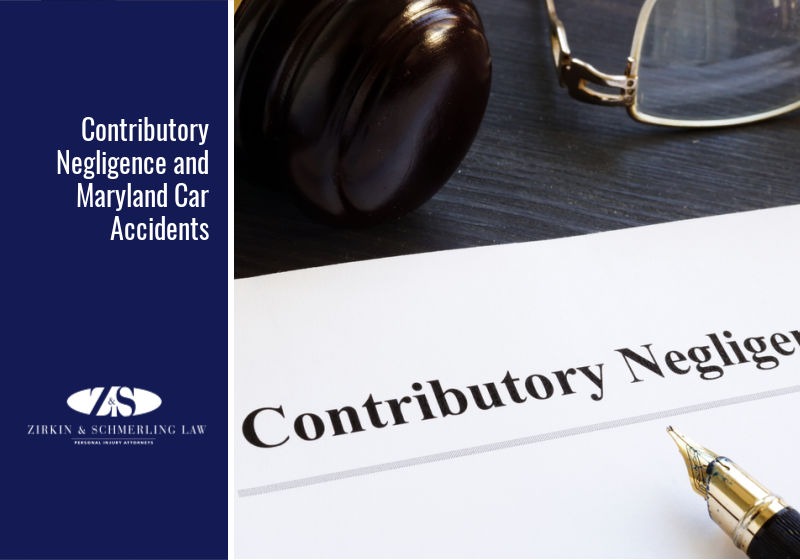
Each state has negligence laws that they follow when dealing with legal situations, such as car accidents. These negligence laws are put in place to help determine who was at fault and even how much compensation a person can get from insurance after being involved in an accident.
For example, if a person files a Maryland accident claim but is found negligent, this could affect their claim and how much compensation they will receive.
Maryland, unlike most other states, uses contributory negligence laws when dealing with car accidents. We’ll get into this below to help you better understand how this negligence system works.
If you have any questions about a case or contributory negligence, don’t hesitate to reach out to one of our car accident Maryland attorneys.
What is Negligence?
When someone is negligent, they are considered to have acted carelessly or recklessly. With car accidents, negligence laws are specifically used to determine whether someone owed another person a duty of care. If they did, and that duty of care was breached, they are considered to be negligent and thus responsible for what happened.
With driving, negligence refers specifically to the driver’s responsibility to act with care so as not to cause harm to anyone else. To determine whether or not a driver is responsible after an accident, the following elements of negligence will be considered:
- Did the driver owe the injured party a duty of care?
- Did the driver breach that duty?
- Did the driver’s breach of duty cause the accident?
- Were the victim’s injuries a direct result of the accident caused by the breach of duty?
If the answer to all of these questions is “yes,” then the driver will be determined to have acted negligently and will be held accountable for their actions. However, it is possible for more than one person to have acted negligently. This is the second part of why negligence laws are necessary.
If the injured victim who is filing a claim against the other party is found to have also acted negligently in some way, thus contributing to the accident, their percentage of negligence or fault can affect how much compensation they can recover, if any.
How Does Contributory Negligence Work After a Car Accident in Maryland?
Most states in the U.S. follow comparative, but Maryland is one of four states—plus the District of Columbia—that follows contributory negligence.
Contributory negligence essentially states that an injured party cannot receive any compensation for damages if they are found to have been negligent and contributed to the accident in any capacity. This means that even if the injured party is only 1% at fault, they will still not be allowed to file a claim against the other party that is 99% at fault.
Understandably, this can be incredibly frustrating for the injured victim. And this is why most other states consider contributory negligence to be unfair. If you live in a state like Maryland, where they have contributory negligence laws, you will need a good lawyer who can fight for your rights to make sure you carry none of that blame or negligence for causing the accident.
Contributory Negligence vs. Comparative Negligence
To give you a better understanding of how negligence can work, we will provide a comparison of contributory negligence vs. comparative negligence.
Not all states use harsh contributory negligence laws. Most of them use the more reasonable comparative fault system.
With comparative negligence, the injured party can still file a claim against the other party, even if they are partially at fault. However, the compensation they are awarded will simply be reduced based on their percentage of fault.
For example, if the injured party is awarded a $300,000 settlement, but they are found to have contributed 20% to the accident, their settlement will be reduced to $240,000, as $60,000 is 20% of $300,0000.
So with contributory negligence, you cannot recover anything if you contributed at all to the accident. But with comparative negligence, you can still recover damages but will have your compensation reduced based on how much you contributed to the accident.
How Can Contributory Negligence Affect My Maryland Car Accident Claim?
Contributory negligence can very easily affect your claim. If the other driver is obviously at fault, you can file a claim against them. However, even if the other driver is 99% at fault, and something you did makes you 1% at fault, you will not be eligible to recover compensation for your injuries and other damages.
This is why injured victims must work with an experienced attorney. You will need professional representation to ensure that the insurance company does not get away with blaming you in any way for the accident—and this can happen. Insurance companies are notorious for trying to get out of paying settlements or offering reduced settlements. So you want to make sure the other party carries 100% of the blame in order to recover a fair settlement.
Have a Legal Question About a Personal Injury? We Have Answers.
At Zirkin and Schmerling Law, our team of Maryland personal injury attorneys is dedicated to helping injured victims get the compensation they deserve. We have experience handling a wide variety of car accident cases and know what it takes to prove that our clients are innocent and deserve to receive a full and fair settlement for their damages.
Contact us or call us at 410-753-4611 to set up an appointment with one of our personal injury attorneys today.
